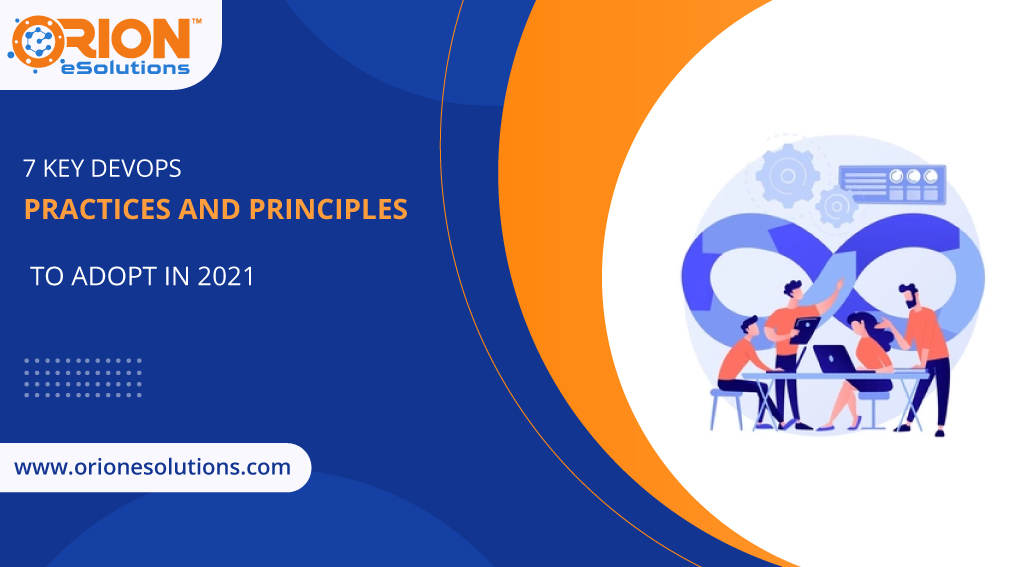Developers and operators no longer work in isolation. Agile has taken over software development, continuous workflow and continuous development is the norm. New team roles have been set to get short sprints and frequent releases every two weeks or even daily.
DevOps is the go-to software development approach today. Industry leaders such as Facebook, Netflix, Amazon, and Etsy among others have adopted it. Here, we will see 7 DevOps practices and 7 DevOps principles that can improve performance, enhance business success, and accelerate competitiveness.
Let us break down DevOps into understandable chunks for real-world implementation.
7 KEY DEVOPS PRACTICES
Configuration Management
Using version control in a repeatable way, configuration management enables making and managing changes to the software. There are two components to configuration management:
- Using a versioning control software like Git.
- A strategy involving standard code repository management like Feature branch workflow or Gitflow workflow.
Continuous Integration
Code is integrated into a shared repository. This enables developers to get instant feedback on its success in real-time. It is the foundation of continuous delivery as well as continuous deployment practices.
Automated Testing
Automated testing advices the use of specialized software for tests. It can control software testing execution as well as compare the results. Manually running repetitive tests is a tedious task. Automated tests are unique to each program and can be done on the basis of 7 elements:
- Component
- Unit
- End to end
- Performance
- Integration
- 508 Compliance
- Security
Infrastructure as Code
Entire physical or virtual environments can be supported by Infrastructure as Code. This includes computing and networking infrastructure. This can help in faster outage recovery and give the developer version control ability. Chef, Ansible, Puppet, Pulumi, CFEngine, and Terraform are some examples.
Continuous Delivery
For continuous development, a series of automated steps can ensure that any change to the source code is ready for a production release as soon as it gets validated. Building, testing, and deploying are automated. Lower environments such as QA and UA also follow similar procedures.
Continuous Deployment
This is the end to end automation of production deployment. A hybrid approach is advised in this practice where automated and manual steps work together. The aim is to get the code deployed as soon as it passes the tests.
Continuous Monitoring
The health of the application must be continuously monitored by the teams. Being proactively alert and taking actions in key areas in the production environment minimizes the time between identifying and resolving an issue.
From these practices, it can be understood that DevOps is a culture of software development that prioritizes collaboration, communication, sharing, and openness. To adopt DevOps, no technical innovations are needed. Just the right principles and value integration to your organization’s needs will do. Let us look how to organize a DevOps environment through 7 key DevOps principles.
7 KEY DEVOPS PRINCIPLES
- Constant communication and continuous collaboration among the teams.
- Gradual rollouts that helps make updates or roll it back if an error occurs.
- Streamlining workflow by sharing end to end responsibility among each team members.
- Addressing issues quickly by performing DevOps tasks early in the project lifecycle.
- Automating as many processes as possible to reduce redundant, time consuming tasks.
- Measuring metrics to make fact backed decisions through KPIs.
- Promoting transparency by creating a collective intelligence through information sharing.
The software development stages of planning, coding, testing, deployment, and feedback gathering can be time consuming. This can mean that by the time a software is production ready, the company may be already behind its competitors.
DevOps addresses this through smaller chunks of releases enabling faster deployment and getting feedback on the go. But, it does not stop here. Industry experts are making some predictions about the future of DevOps as well.
THE FUTURE
Digital transformation will be smoother by involving development teams in the decision making process.
BizDevOps is the future. This means including the business and marketing staff in the DevOps teams, throughout the process. This means companies can sculpt more user-oriented products.
Safe DevOps is another aspect. Companies will integrate security into the development and deployment process. This is particularly necessary as organizations migrate to the cloud. Cloud native security will be an essential in the future.
CONCLUDING
In two years, the DevOps market is expected to cross $10.31 Billion. Trainers, consulting service providers, DevOps vendors, cloud service providers, telecom service providers, system integrators, and government agencies will benefit from the adoption of the DevOps culture.
By adopting these principles and practices into the company culture, the development, operations and quality assurance teams can work in sync. DevOps automation enhances operational abilities and can assist in faster deployment, scalability, and agility at lower capital and operational expenditure. We at Orion have the experience and expertise to be the one-stop for all your DevOps requirements.









